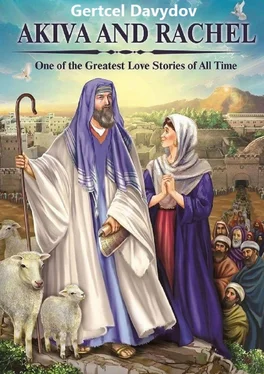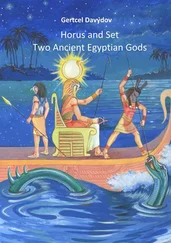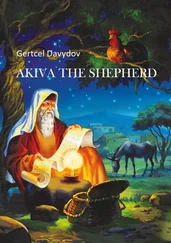“When there are a lot of visitors, you do not think about yourself. You just think about finishing everything as quickly as possible and going to bed. Yesterday, I was so tired that today I slept in until midday. I remembered to read the prayers though and after breakfast, I decided to come out for a walk,” Rachel replied smiling good-naturedly.
“What prayers do you read in the morning and before you go to sleep?”
“Before going to sleep, I thank the merciful Creator for the day, for the fact that I have lived through it, and in the morning, for the fact that I have woken up, and then I read the morning blessings.”
Rachel’s response was a revelation for Akiva.
“Everyone wakes up in the morning. Do you really need to give thanks for that?”
“Yes Akiva, we must express gratitude and thanks to the Creator for everything He gives us. We are used to waking up in the morning, to the sun rising and setting, the day following night, to the trees bearing fruit, but we must understand, that it is all a miracle. Everything that happens in our world – the world itself exists only by the grace of the Creator.”
“What else is in the prayers?” Everything Rachel said was so new and curious to Akiva that she never ceased to surprise him.
“If you knew how to read, I would bring you a prayer book and other religious texts for you to study.”
“It’s too late for me to learn anything now and start studying religious books.” Akiva was quiet for a moment and then with a sudden bitter smile, he said, “Rachel, tell me, for what? What do I have to thank the Creator for, that at thirty years of age I still can’t read or write?”
Rachel was embarrassed and did not reply.
“You have everything going for you. You are young, beautiful, rich and clever. You have a lot to thank the creator for, but I who have nothing, not even a home, tell me, what would you have me thank the creator for?” Akiva had become increasingly angry.
“There is so much in this world that you can be thankful for. You have to learn to see the good in things. You can be grateful that you see this gorgeous sun, that you hear the sound of the river and the rustle of the leaves on the trees, that you can walk, for lots of things, that you have work, that you have a roof over your head, that you are caring, attentive and wise. See how much you have to be grateful for,” Rachel said tenderly, as if she were speaking to a child.
“You call me wise,” Akiva laughed, “but you barely know me.”
“You don’t have to have known a person for many years to understand whether they are wise or not. There are people who read a lot, who can talk on a variety of topics with a clever expression on their face, but even with the best will in the world, you could never call them wise. And then there are those who may even be illiterate, but you can spot their wisdom a long way off. Wisdom is a gift from the Creator. You either have it or you don’t. Akiva if you could study, you would make a good rabbi.”
“Rachel, soon I will be forty. School is for children who have been learning since they were little,” Akiva said but he had softened his tone no longer showing his anger. Rachel stuck to her own point of view.
“It is never too late to learn.”
The young girl threw a glance at the sun, which was already setting beyond the river. It was time for her to go.
“Will you come again tomorrow?” Akiva asked, his voice carrying simultaneously notes of hope and despair.
“I don’t know yet. Akiva, try and turn over a new leaf in your life, and think about what I said about learning. I am certain that much in your life still lies ahead of you. Try and pray before you go to sleep,” advised Rachel before hurrying away.
“But I don’t know any prayers!” Akiva cried after her.
“Just speak words of gratitude and say what’s in your heart.” Rachel’s sonorous, girlish voice reached him now from a distance.
After Rachel had left, Akiva sat by the river for a long time thinking over what she had said. He thought about his conversation with Rachel until he lay down to sleep. Having thanked the creator for the day, for the fact that he had a job and a roof over his head, Akiva fell into a deep sleep.
* * *
In the morning Akiva drove the herd down to the river again dreaming only of one thing: to see Rachel again. Over and over, he caught himself thinking that he could not live without seeing her again. Even the fear of losing his job no longer affected him.
Hearing someone’s footsteps from afar, Akiva turned to look and spotted the long-awaited silhouette. The young girl approached him and as she had done on the previous occasion, she said quietly:
“Peace to you Akiva.”
“Peace to you Rachel!” The shepherd answered her with bated breath.
“Did you say a prayer last night before going to sleep? Rachel asked.
“Yes, I did, but in the morning I forgot,” said Akiva and as if apologising held open his hands.
Rachel was pleased.
“That’s a good start. Learn to thank the merciful Creator for everything.”
“Why do you always repeat the word ‘merciful’? ” Asked Akiva.
“Because the Creator is merciful to all his creations.”
“Rachel, if He really is merciful, then why did He allow the Romans to destroy the Second Temple?” Akiva said, directing the complex question at the girl he loved.
“The Rabbis believe that the Romans are simply an instrument in His hands. It’s not the Romans who destroyed the Temple. We did that. Our actions brought about the destruction of the Temple. The Romans simply carried out the Creator’s judgement. The First Temple, the Temple of King Solomon,” said Rachel continuing her story “was demolished in punishment of three sins: bloodshed, idolatry and the retreat of the Jews from the laws given to them by God 19 19 Talmud, Yoma 9B.
. Now that there is neither idolatry nor bloodshed, the wisemen have come to the conclusion, that there were spiritual reasons for the destruction of the Temple. They tend to think that the Second Temple was destroyed due to unfounded hatred. The All-merciful probably doesn’t like how we treat one another. We have forgotten how to forgive.”
“How was that evident?” Akiva asked his voluntary teacher.
Rachel answered patiently. “It was everywhere and in everything. People overfilled the cup of His unlimited patience. Shortly before the Temple was destroyed, something happened. A wealthy man from Jerusalem held a feast and invited lots of guests including my father who was unable to attend because he was away. The man who arranged the feast had a close friend called Kamtsa and a sworn enemy, Bar Kamtsa (The story of Kamtsa and Bar Kamtsa is cited in the Babylonian Talmud, Tractate Gittin). The man sent his servant to invite his friend Kamtsa to the feast but the messenger got the address wrong and conveyed the invitation to Bar Kamtsa. Bar Kamtsa couldn’t understand what was happening and asked the messenger again whether the invitation was really meant for him, to which the messenger confirmed that it was.
Deciding that his enemy must be offering a reconciliation, Bar Kamtsa suspected nothing, put on expensive clothes and went to the feast at the house of his enemy. He took his place amongst the guests but when the host saw him there, he shouted: “What are you doing here? How dare you come into my house uninvited?”
Bar Kamtsa realised that the messenger must have made a mistake and said, “I will pay you for my portion of food, only please, do not humiliate me in front of all the other guests. Many respected people of Jerusalem are among them. How will I appear in their eyes?”
The host refused to accept his request so Bar Kamtsa offered to pay for half the entire cost of the feast but the host still wouldn’t agree.
Читать дальше












